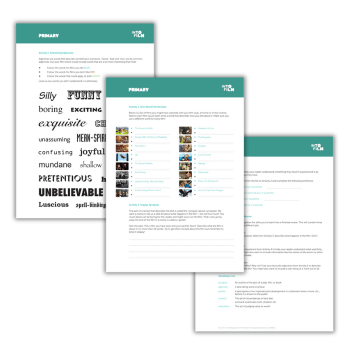This four-page guide from Into Film contains five activities focused on how to write a film review. Use it in primary classes or school film clubs.
Interesting adjectives
Look at the list of adjectives on the worksheet and decide which ones apply to films you like and films you don’t like. Look up any words you don’t understand in a dictionary.
One-word film reviews
Next to each film on the worksheet that you’ve seen, write a word that describes how you feel about it. Use a different word for every film.
Snappy synopses
Get into pairs. Pick a film you have seen and your partner hasn’t. Describe what the film is about in no more than 20 words. Try to get them excited about the film, but remember to keep it snappy.
Comparisons
Pick a film you have seen and complete the following sentences: “If this film were a/an…”
- animal it would be…
- ice cream flavour it would be…
- a book it would be…
- a celebrity it would be…
How to write a film review
Piece together the skills you’ve learnt to write your own film review. This will contain three paragraphs, each doing a different job:
Paragraph 1: Synopsis Using your snappy synopses skills from Activity 3, describe what happens in the film. Don’t include any spoilers!
Paragraph 2: Context Use your favourite comparisons from Activity 4 to help your reader understand what watching the film is like. You might also want to include information like the names of the actors or other films the director has made.
Paragraph 3: Evaluation Did you like the film? Why? Why not? Use your favourite adjectives from Activity 1 to describe how you feel about the film. You might also want to include a star rating or a mark out of 10.
Vocabulary list
- Synopsis – Outline of the plot of a play, film, or book
- Adjective – Describing word or phrase
- Spoiler – Description of an important plot development in a television show, movie, etc., before it is shown to the public
- Context – Set of circumstances or facts that surround a particular event, situation, etc
- Evaluation – Act of judging value or worth
Into Film is the UK’s leading charity for film in education.














